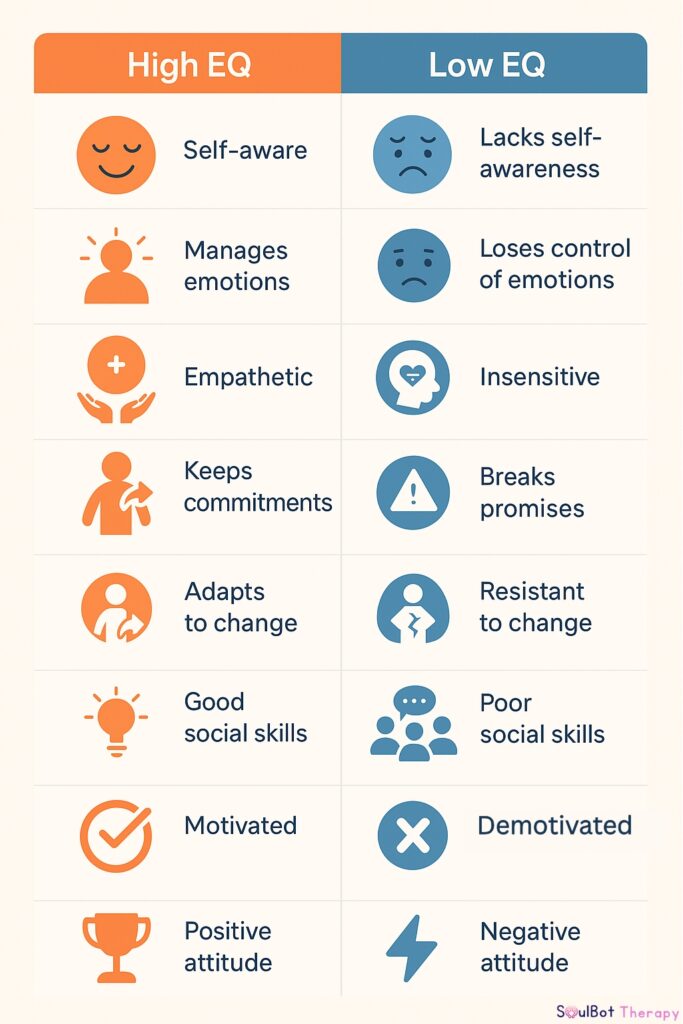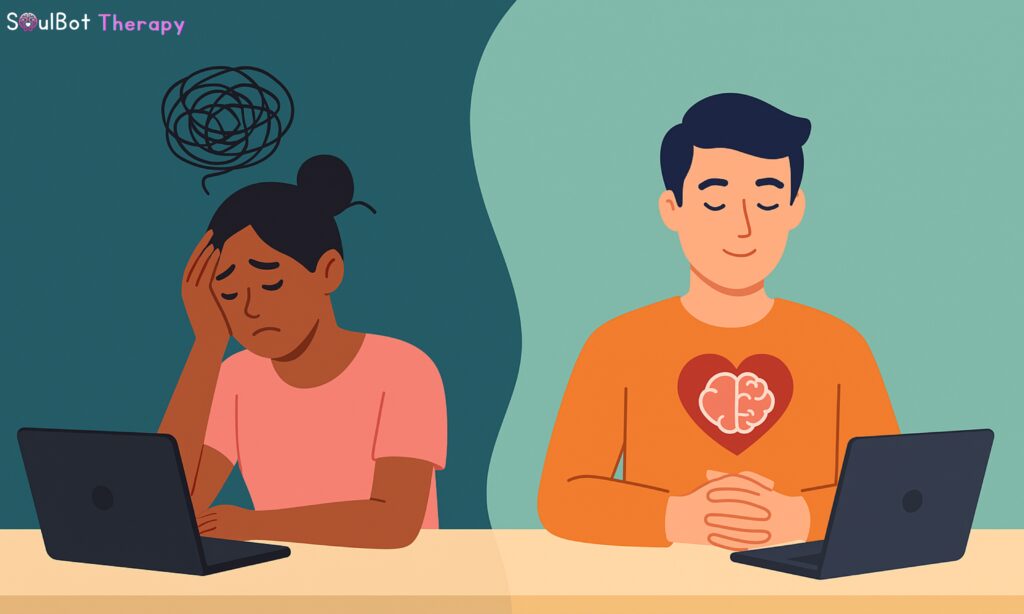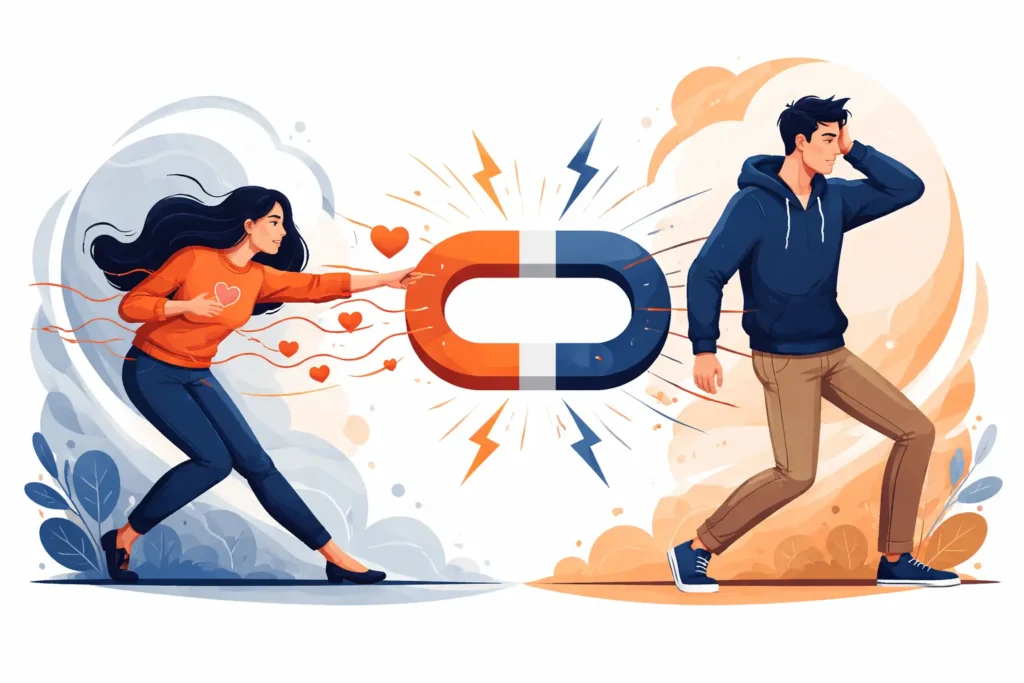High vs low emotional intelligence isn’t just about how well you “control your feelings.” It’s about how well you understand, express, and respond to your emotions and the people around you.
And the difference?
It shows up in how you argue, apologise, listen, love, and even lead.
Understanding high vs low emotional intelligence helps you recognise emotional patterns, improve relationships, and respond instead of react. In this blog, we’ll explore the psychology-backed signs of high vs low emotional intelligence, how to know where you stand, and how to start building emotional intelligence in your daily life.
What Is Emotional Intelligence?
Emotional intelligence is less about controlling emotions and more about responding to them with awareness and choice. Emotional intelligence (EQ) is your ability to:
- Recognise your emotions
- Regulate them (especially under stress)
- Understand others’ feelings.
- Communicate with empathy
- Repair emotional conflict
It’s not about being calm 24/7.
It’s about being self-aware, emotionally present, and human even when life is hard.
High vs Low Emotional Intelligence: What’s the Real Difference?
Let’s break it down by traits, reactions, and communication styles:
| Trait | Low EQ | High EQ |
| Emotional Awareness | Can’t explain what they feel and over-identify with one emotion | Can name complex emotions and what caused them |
| Reactivity | Blames others, lashes out, or withdraws | Pauses before responding; regulates under pressure |
| Empathy | Dismisses or minimizes others’ feelings | Validates, listens, and reflects emotional meaning |
| Apology Style | Defensive or “Sorry, you feel that way.” | Asks questions, reflects, and listens without fixing |
| Conflict Response | Avoids or escalates conflict quickly | Asks questions, reflects, and listens without fixing |
| Listening | Interrupts or makes it about them | Asks questions, reflects back, listens without fixing |
| Boundaries | Either avoids boundaries or enforces them harshly | Sets clear, kind boundaries with emotional honesty |
| Self-Talk | Harsh inner critic, guilt-driven | Aware of inner voice, uses self-compassion |

How Do You Know If You Have Low Emotional Intelligence?
Here are 7 subtle signs of low EQ in everyday life:
- You interrupt emotional conversations or change the subject quickly.
- You feel uncomfortable with other people’s emotions, especially sadness or vulnerability.
- You often think attacked, even when someone is just expressing their needs.
- You struggle to apologise unless you’re 100% sure you’re wrong.
- You react fast when angry, then regret it later.
- You avoid tough conversations, hoping the issue will disappear.
- You say, “I’m fine,” even when you’re clearly not.
None of these makes you a bad person. They point to areas where emotional intelligence can grow.
📘 Free Emotional Reflection Journal
Start a 7-day self-reflection journey designed to build emotional awareness, clarity, and calm.
👉 Get the Free SoulSearch Journal
Signs of High Emotional Intelligence in Real Life
If you relate to these traits, your EQ might be stronger than you think:
- You can pause before reacting, even when triggered.
- You often ask yourself: “Why did that bother me so much?”
- You reflect after arguments, not just blame.
- You’re willing to hold space for someone’s feelings, even when uncomfortable.
- You say things like: “I didn’t mean to hurt you, but I can see that I did.”
This isn’t perfection, it’s emotional maturity.
What Psychology Says About High vs Low EQ?
Psychologists like Daniel Goleman and Peter Salovey describe emotional intelligence as involving five core components.
📚 Want to dive deeper? Check out this research-backed article on EQ and relationships by Greater Good Science Center
High vs Low EQ in Real World Scenarios
| Scenario | Low EQ Reaction | High EQ Response |
| Criticism from a partner | “You always blame me!” | “That hurt — but I want to understand.” |
| Conflict at work | Ghosts, explodes, or gossips | Clarifies calmly, seeks repair |
| Being triggered | Reacts immediately | Breathes → Regulates → Reflects |
| Someone else is upset | Minimizes: “You’re overreacting.” | Holds space: “I see that this matters to you.” |
| Messed up / mistake | Denies or justifies | Owns it: “You’re right, I didn’t handle that well.” |
Low EQ typically lacks the first two awareness and regulation. High EQ integrates all five.
How EQ Affects Relationships (Romantic & Beyond)?
High emotional intelligence creates:
- 🧠 Emotional safety
- 🗣 Open communication
- 🧱 Clear Boundaries
- 🩹 Conflict repair
- 🫶 Trust and long-term connection
Low EQ often results in:
- ❌ Misunderstandings
- 😤 Escalated fights
- 🚪 Emotional shutdown
- 🔁 Repetitive drama loops
- 😔 Emotional isolation
Can You Move From Low to High EQ?
Many people with low EQ also struggle with emotional unavailability without realising it.
- Journaling your emotional triggers
- Pausing before responding
- Asking open-ended questions
- Learning to name emotions beyond “angry” and “fine.”
- Practising reflective listening in conflict
It starts with one honest pause a day. Emotional intelligence research is widely used in coaching, leadership development, and relationship counselling, even though it’s not a clinical diagnosis.
🧪 Not Sure Where You Stand? Take the EQ Test
Get a clearer picture of your emotional patterns with our upcoming Emotional Intelligence Test:
- Quick self-reflection
- No labels or judgment
- Instant insight into how you show up emotionally
Reviewed by the SoulBot Mental Wellness Team
This content is intended for self-awareness and emotional growth, not diagnosis or treatment.Final Thought: Emotional Intelligence Isn’t About Being Perfect, It’s About Being Present
Whether you lean toward high or low emotional intelligence, the fact that you’re here means you’re growing.
- You’re not here to judge yourself.
- You’re here to build awareness and then build new patterns.
Because emotional intelligence isn’t a trait it’s a skill. Start building yours today.








